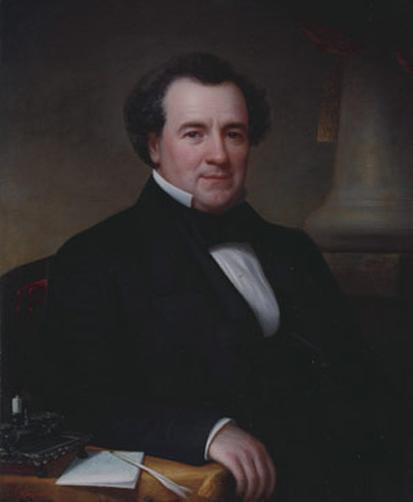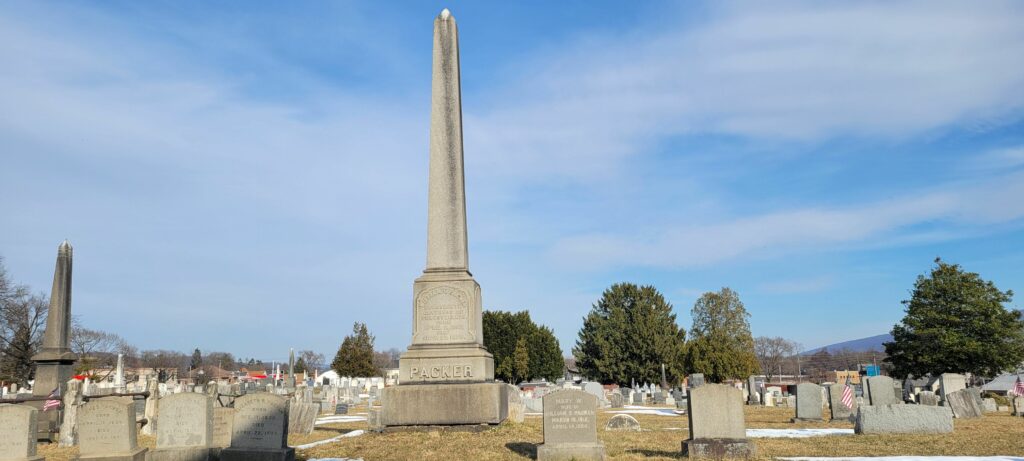
The year was 1857 and the United States, let alone Pennsylvania, faced economic challenges and the divide between pro-slave states and anti-slave states was now a chasm. There was a struggle with the Kansas Act that had some states pushing for slavery in the Kansas Territory and other states pushing against it.
The Whig party had recently broken up, over slave issues, and reformed as the Republican party with famed explorer John Fremont as the first Republican candidate for President in 1856. However, he was defeated by Pennsylvania’s own James Buchcanan, the Democrat, by 500,000 votes.
At this same time, economic expectations faltered as gold mining did not produce the expected precious metals the dollar was based on. All of this occurred when the United States Supreme Court handed down the Dred Scott decision, which said, that Scott – a slave – could not sue for his freedom because he was black.
It was in this social, economic and political quagmire that Williamsport’s own William F. Packer was elected the next governor of Pennsylvania.
In John Megginess’s “History of Lycoming County” it detailed that Packer was born in Howard Township on April 2, 1807.
“At the age of 13 years, he began learning the printer’s trade in the office of the Public inquirer in Sunbury.” He then worked for the Patriot newspaper in Bellefonte and the Intelligencer in Harrisburg from 1825 to 1827.
He came to Williamsport to study law with Joseph B. Anthony (of which Anthony Township was named for) “but was never admitted to the bar.” On December 24, 1829, he married Mary W. Vanderbilt, and the pair had six children.

Rising through the ranks
In 1834, Packer was elected one “of the first school directors” for the WIlliamsport Area School Board. He was then elected to represent Williamsport in a countywide meeting involving school board officials and county officials to discuss passing laws about public schooling.
He owned part of the Lycoming Gazette for several years and he was appointed by Governor Daniel Porter as a Canal Commissioner in 1839. According to several other entries in Meginess’s book, he was also responsible for helping incorporate some of the towns in Lycoming County.
In 1842, Porter made him auditor general and in 1846 he was elected to the state House of Representatives. In 1849, he was made Speaker of the House. In 1856, he helped get Buchanon elected President of the United States.
Based on a name search on Newspapers.com, Packer was referred to as “General Packer” despite no record of military service. Even though he was not referred to as “General Packer” in Megginess’s book.
According to the March 4, 1857, edition of the Pittsburgh Daily Post, “no one could have been more fortunate in possessing all the prerequisites which qualify a man for the Governorship, than the man elected by the Convention as our standard-bearer in the. next campaign Gen. William F. Packer, of Lycoming.”
At 49 years old, Packer was considered “in the prime of life” and in political career had “served the people of his native State in several important positions, and in every emergency has been found fully equal to the incumbent duties of his situation.”
After three years as Canal Commissioner, Packer was appointed to the post of “Auditor General,” which he filled with competent “ability for three years.”
Packer was then elected to the State Legislature. He was chosen “speaker of the body in the winter of (1848 and 1849).
Campaign for governor
“When he served out his term, impressing upon it, each successive year, the footprints of his advancement toward the goal of great enlightened statesmanship, and a dignified and powerful oratory,” the article said. “In his voice, he is…blessed; in his manner he is pleasant, forcible and earnest; and in appearance he is every inch a Governor.”
According to the Bradford Reporter (which was from Wilmot’s home town of Towanda), 188,887 votes counted for Packer, with 146,136 for David Wilmot and 28,132 for Isaac Hazelhurst (who ran under the Know Nothing/American party). In Lycoming County alone, 2,834 voted for Packer with 1,684 going to Wilmot and 347 going Hazelhurst. In Wilmot’s home county of Bradford, he had 5,682 and Packer had 2,082 (Hazelhurst only had 6 votes).
However, the Lancaster Intelligencer said that Packer’s “official majority in Lycoming county is 1,171.” The previous October the “Democrat majority was 397.” It went on to say that in “Williamsport, his residence, he ran about 200 votes ahead of the party vote last fall.”
The Lewisburg Chronicle explained, in the Nov. 6, 1857 issue, that “the only Whig counties giving Packer the absolute majorities” were Philadelphia, Adams and Franklin. “All (of these counties were) all bordering Slave States which had many Roman Catholics, (and) Whigs.”
In a little vignette found in the Nov. 9, 1857 issue of the Gettysburg Compiler, it shared that Packer won by 13 votes because this town had “always been hostile to the measures of the Democrat party,” yet it still gave Packer his first victory.
The article described how in the “township was an aged and venerable citizen who voted for Gen. Washington, and ever since that day advocated the principles of the Democrat party,” the article said. “He made General Packer his first pair of shoes and voted for him at the recent election.”
Many rival newspapers complained that electing Packer was electing a pro-slavery governor. One (Raftsman’s Journal of Clearfield) put together an alliterative ditty in their Nov. 25 issue that said that there will be a “Pennsylvania Pro-slavery Popery Polygamy Packer Plunder Paddy Party” at his inauguration.
Before he could take office, Packer suffered a health setback. The Wayne County Herald on Dec. 17, 1857 said that Packer was “out hunting, about 30 miles north of Williamsport.” He “ruptured a blood vessel, or strained himself in some way, which caused a hemorrhage of the lungs and for a few days his danger was considered imminent.” However, he was “now out of danger and able to be out of doors, and receiving the congratulations of his numerous friends at the success enjoyed during the hunt, in the course of which the General shot a fine buck.”
Inauguration
He was inaugurated on Jan. 19, 1858. The Columbia Democrat described it as a “display of military and civil authorities; with attention (on) the members of the outgoing (William Bigler administration) as well as the (members of the) incoming administration (which) brought together a numerous assembly.”
It was recorded as one of the largest gatherings of people in Harrisburg to that date.
The Columbia paper said that “Governor Packer enters upon the discharge of his Executive duties under very auspices circumstances.” He came into power with a “large majority of the popular vote, he has only to pursue a straight forward democratic course to retain his strong hold upon their affection and confidence.”
A writer for this paper said “We have known General Packer, intimately from boyhood, and entrain the most implicit confidence in his ability, honesty and fidelity, and have no fear that the democracy of Pennsylvania will ever be disappointed in his administrative policy.”
Packer was described as “marked with sound judgment and great ability.”
He served just one term and was succeeded by Andrew Curtin as governor. It’s fitting that Curtin Intermediate School is on Packer Street.
On September 27, 1870, Packer died. The Evening Telegraph of Philadelphia, on September 28, 1870 described him as “much respected by men of all political opinions.”
“Personally, he was a gentleman of eminently agreeable and urbane manners, and he leaves a large number of warm friends to mourn his loss,” said the Telegraph.
Packer is interred in the cemetery on Washington Street.


